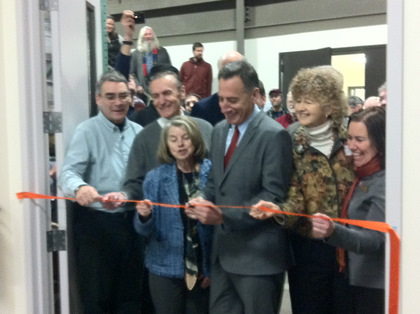
Vermont Governor Peter Shumlin, center, cuts the opening ribbon for the Mad River Valley Food Hub. Photo: Kara Herlihy
Governor Peter Shumlin cut the ribbon on the state’s first small-scale food-processing facility, the Mad River Food Hub (MRFH), on Tuesday, January 17, amidst community members, local food producers and legislators.
The official grand opening followed a chamber-sponsored breakfast with Senator Vince Illuzzi and the Senate Economic Development Committee members at MINT in Waitsfield. State and local elected officials toured the 3,200-square-foot facility that is the only state-licensed meat and vegetable processing facility in New England.
MRFH provides livestock and vegetable producers the opportunity to add value to products and tap into the growing local food movement in Vermont, according to MRFH owner Robin Morris.
FIRST OF ITS KIND
The Mad River Food Hub is the first of its kind. Located in the Irasville Business Park, it allows producers to use a wide array of commercial-scale meat and vegetable processing equipment. It also offers on-site storage and distribution services to local market outlets.
FARM TO PLATE IS WORKING
Shumlin said that the Mad River Food Hub is proof that “Farm to Plate is working.”
Morris said that the design and implementation of the Mad River Food Hub’s services relied extensively on the research, data and analysis from the state’s Farm to Plate strategic plan. Funding for the facility was provided by a number of state, federal and foundation funds as well as private investment.
“This new facility is the first for-profit food hub and the only facility in the Northeast that combines a state-inspected meat and vegetable facility; we also chose to organize as a for-profit business as we felt it provided a more likely longevity for the services offered,” Morris said.
More than 10 local farms and food producers are already using the MRFH’s service including Vermont Bean Crafters, The Vermont Meat Company, Vermont Raw Pet Food, Lawson’s Finest, Faylor Farm, Kingsbury Market Garden, Screamin Ridge Farm, Knoll Farm, Tannery Farm and Three Springs Farm.
“The MRFH is the result of many years of discussion and collaboration with the Mad River Valley Localvore Project, the Valley Futures Network, the Mad River Valley Planning District, the Mad River Valley Chamber of Commerce, Vermont Land Trust, businesses, farmers, nonprofits and residents,” Morris said.
Joe Buley of Screamin’ Ridge Farm utilizes the MRFH to grow and expand his business that combines farming and food production; he said the fully licensed facility allows him to process and sell his products legally and take on more growers.
A TEAM EFFORT
Carolyn Partridge, chair of the House Agriculture Committee, thanked Morris and commended the many individuals that contributed to what she called a “team effort” to open the food hub. Partridge said the MRFH provides the opportunity to start and grow a business by renting space and equipment and said she hoped the food hub would be seen as a model for the rest of the state.
The MRFH was closed for the entire day to tour residents and officials around the newly opened facility; currently the MRFH is waiting on USDA certification that will allow them to sell meat out of state. Morris estimated that the process could take up to four weeks.
The MRFH applied for and was awarded several grants that served as capital to purchase equipment and fund the project including a $7,500 grant from the Vermont Sustainable Jobs Fund Farm to Plate initiative.
The Mad River Valley Chamber of Commerce applied for and was awarded a $50,000 matching USDA Rural Business Enterprise Grant (RBEG) to purchase meat and vegetable processing equipment for the MRFH.
The MRFH is classified as a L3C, a for-profit business; nonprofits may serve as the applicant for the grant, even though the recipient is technically a for-profit entity.
The RBEG program provides grants for rural projects that finance and facilitate development of small and emerging rural businesses, help fund incubators and help fund employment-related adult education programs to assist with business development.
On November 16, the MRFH hosted an “Essentials of food safety for food producers” course specifically designed for producers working in a shared-use facility. Chefs, farmers and business owners lease the space that is subject to a strict set of state-regulated and enforced sanitation requirements.
“Funding has come from a variety of sources including Vermont Sustainable Jobs Fund – Farm to Plate, the Vermont Housing and Conservation Board Farm Viability Program, Vermont Agriculture Innovation Center, Agriculture Specialty Crop Block Grant Program and local residents,” Morris said.
For more information about the Mad River Food Hub, visit www.madriverfoodhub.com.
{loadnavigation}







